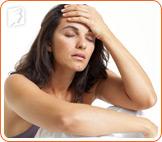Fatigue affects around 80% of women during menopause to some degree. Although the body's capabilities change with age, fatigue and tiredness should not be an inevitable part of aging. Many people find that fatigue is connected to their lifestyle habits or an underlying medical condition.
How Fatigue Works
Fatigue results from disrupted sleep patterns due to stress, anxiety, or an underlying medical condition. Fatigue can affect life in many ways and make normal activities seem difficult. It can be hard to pinpoint what causes fatigue and how it can be effectively treated. Fatigue is not just feeling tired - it is also feeling a lack of motivation, a desire to sleep, and feeling chronically weary.
The Connection between Night Sweats and Fatigue

Insomnia, stress, anxiety, and hot flashes are some factors that can cause both fatigue and lack of sleep. Research shows that middle-aged women are at the highest risk for getting fatigued. This correlates to when women usually experience menopause and the symptoms that usually go along with it, like night sweats.
Most people find that they need at least seven hours a sleep a night to remain active during the day. During menopause, the body is going through many changes, and sleep patterns can be interrupted. Night sweats can disrupt sleep and lead to a woman becoming fatigued. Night sweats are usually caused by hormonal changes during menopause.
However, fatigue can have a wide range of causes, so if fatigue is lowering the quality of your life, it is advised to make an appointment with your physician.
Fatigue's Impacts
Night sweats and fatigue can affect both mental and physical health.
Mental health
Women who suffer from fatigue during menopause may feel unable or unmotivated to participate in activities as they did before. They may become isolated from others, which can lead to depression, mood swings, stress, and anxiety.
Physical health

Fatigue can make it more difficult to operate machinery, including driving a car. Symptoms of fatigue include dizziness, headaches, and loss of appetite. It can also lead to physical weakness and make a person more susceptible to diseases and infections.
Treatment for Night Sweats Linked to Fatigue
Night sweat and fatigue can be treated in a number of ways. Getting regular exercise and eating a healthy diet are always a good starting point. Alternative therapies, such as yoga and natural supplements, have been found by some women to help ease hot flashes and other menopause symptoms.
The most effective treatment for the most common menopause symptoms in hormone replacement therapy (HRT). HRT adds the hormones estrogen and sometimes progesterone to the body. These decrease during menopause and are responsible for the majority of menopausal symptoms. However, HRT does have some side effects, so it is important to talk to your doctor about your risk factors and options before you start taking it.
Click on the following link for more information about treatment for night sweats and fatigue.
Sources
- Mayo Clinic Staff. (2013). Fatigue. Retrieved October 30, 2015, from http://www.mayoclinic.org/symptoms/fatigue/basics/definition/sym-20050894
- Mayo Clinic Staff. (2008). Night Sweats. Retrieved October 30, 2015, from http://www.mayoclinic.org/symptoms/night-sweats/basics/causes/sym-20050768
- Office on Women's Health. (2014). Chronic Fatigue Syndrome. Retrieved October 30, 2015, from http://www.womenshealth.gov/publications/our-publications/fact-sheet/chronic-fatigue-syndrome.html



